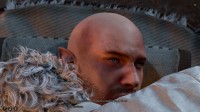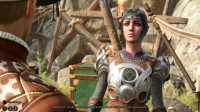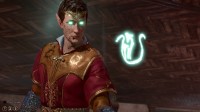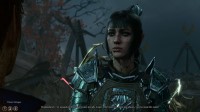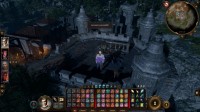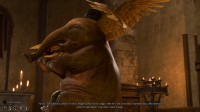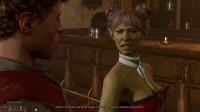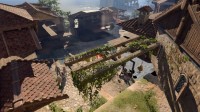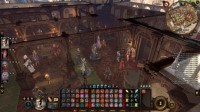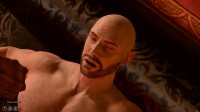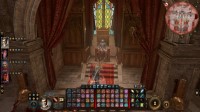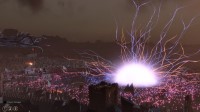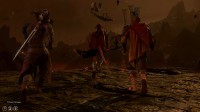Baldur's Gate 3
Playtime: 93.8 Hours
Finished 02 November 2023.Playthrough done in Co-op (2 player) on Normal difficulty, completely vanilla. I played TGNDireGaming true to form as a Swords Bard with a reclassed War Cleric Shadowheart for most of the game, partner played Andrew Tate as a Monk with a default Barbarian Karlach but would more regularly switch companions. All characters were pure at Lv12, but TGN had a Lv1 Sorc offclass for most of the game for Agathys. We generally took the good routes in this playthrough; saving the Druids' Grove in Act 1, destroying Ketheric for the Harpers in Act 2, and helping Orpheus delete the Netherbrain in Act 3. Companions generally had the more positive outcomes as well: Gale returned the Crown to Mystra, Wyll was honoured by his father but chose to continue adventuring, Shadowheart rejected Shar and met her parents, Lae'zel succeeded Orpheus as champion of the Gith in overthrowing Vlaakith, Karlach lived to see Gortash killed, Halsin recovered the child he was looking for, Astarion was able to kill Cazador and release the other captive vampires, and Jaheira and Minsc both survive. Andrew Tate ended up going to Hell (with Karlach and Wyll), which is very fitting - TGN maintained his romance with Shadowheart. An evil playthrough might be fun at some point, but I've got no interest in starting something like that anytime soon as of right now; at the very least, I'd want to wait a year or two to see if Larian plans on releasing an enhanced version as they did with D:OS and D:OS2.
I'm not familiar with Baldur's Gate 1 and 2 as of playing and completing this game, but the presentation of the world doesn't lack for impact even without prior knowledge - BG3 stands very well on its own. Compared to Larian's previous works with the Divinity: Original Sin duology, the writing in this game poses a far darker and more serious tone, while still maintaining a lot of the personality and intriguing characterization of the world that breathed life into their Divinity games. It simultaneously feels like a major evolution of their storytelling to produce such a fantastical tale without masking it all with a comedic undertone, but at the same time so much of the general structure manages to feel very familiar, maybe even stagnant. The pacing of the acts and the plot as it flows through them feels almost the same as the D:OS games in a very predictable manner, yet in retreading this same ground for a third time, the world and characters feel more polished and more prominent than their previous attempts. I think they've done a better job in BG3 than ever before when it comes to a lot of the side plots and random NPCs, and even the key characters in this game tend to be more interesting. Divinity's only truly notable companion (from my current memory) was Jahan, and even that's mostly because his "Daemon Daemonium" schtick was so stupid to the point of hilarity. Most of the characters in this one match or surpass this bar, especially Gale, Karlach, and Shadowheart in my opinion. The fidelity of the voice acting is great across the board; from key characters to a random NPC with a single line, all of the voicework is on point while not sounding like the entire game was acted out by a high school troupe of 3-4 people as you see in most Bethesda games. For better or worse on this front, I didn't feel like there were any specific characters or voice lines that were stupid enough to be memed to hell like the Adoring Fan, or arrow to the knee, or any other number of tired phrases.
As alluded to before, the story of this game doesn't feel particularly new or novel - basically, a great darkness sweeps through the land towards the city of Baldur's Gate and you happen to be in the midst of it, infected with a parasite that will turn your party into 'mind flayers' under the control of a great evil, a newly awoken Elder Brain. Your task is ostensibly to cure yourself, but that naturally turns into a quest to confront and defeat the brain; either dominating it to do your bidding, or destroying it to free the city and the people within. In each of the acts, there is some kind of major conflict that your party must resolve to continue forth: in the first, there is the Druid-Absolute conflict - in the second, Ketheric Thorm's undead cult - and in the third, Thorm's companions and the Elder Brain. We chose all of the "good" routes this time around, which involved helping the Druids protect their land from the encroaching Absolutist goblins, killing Ketheric Thorm and eliminating the threat of Myrkul, god of the Undead, and finally ridding the city of Baldur's Gate from Bhaal's and Bane's influence before freeing the Gith Prince and destroying the brain for good. There is also ample opportunity to take a more evil approach at each of the plot branches, resolving each act's subplot in a number of different ways. You will still go the same locations, but the characters with whom you ally will be very different, and your ultimate objective at the end of the game can take one of many forms depending on your plans for the Brain and the city. As a sidenote, much of this also holds true for many of the sidequests as well. I haven't tried the evil route at all though, so while I can see there is ample possibility to explore different outcomes, I don't know if Larian was able to implement a large number of different unique outcomes or if most of them ultimately filter into a binary good/bad choice. My hope is for the former, but given the sheer scale of this game it might be a bridge too far away from what is realistically achievable.
The mechanics of this game are where I think it struggles to match what Larian found while working on the D:OS games. It's fundamentally built on a different system; Larian licensed both the Baldur's Gate name and the DND 5e mechanics set from Hasbro, while the D:OS games had a more unique implementation of actions and turns. Honestly, the (mostly) raw implementation of the DND 5e ruleset with just a few extra house rules creates more problems than it solves - playing this game really showcases why DND is a tabletop game and not software. Without a human DM to conjure interesting stories or events from a failed roll, nor with the ability to adjust on the fly for streaks of terrible luck or other extenuating circumstances, every check in this game only determines whether or not you get to see part of the game. Dice roll checks like in this game are almost always awful, since they simply encourage savescumming due to the inflexibility of the game itself. The only upside you gain with all of these negatives is that it's sometimes funny in co-op to see a ridiculous sequence of rolls - like several failed advantage rolls with 12-15 bonus, or several crits in a row. Otherwise, it's just a way to easily mask awkward balance and unwieldy combat by saying that anything is "technically" achievable.
A major strength of BG3 (inherited from 5e) is that character creation and overall class balance tends to be pretty decent, but perhaps not perfect. You can very easily find solid contributing roles as any class in the game, and there are plenty of viable builds no matter how you want to play. Of course you can still ruin your characters if you commit to it (like an all-class build) or if you just make a number of poor decisions about your character build. In those cases, you can still respec very easily from near the start of the game - Withers will reset all of your levels for only 100 gold, which is basically a rounding error even in late act 1. With this being said, this game still has very clear division between "better" and "worse" class options. For example, the versatility of a Swords Bard simply outclasses the utility of a Lore Bard, and a Trickster Cleric is pretty much completely useless compared to a Tempest, Life, or War Cleric. Similar divisions exist elsewhere - Barbarians have questionable Advantages over a Fighter while having significantly less damage output available to them. On top of all this, there is almost no feeling of your character progressing across levels outside of gear (unless you're playing magic-enabled classes, which go from unplayable to good over the course of the game). You are only able to improve your stats 3 times in the entire game, which is really ironic considering the amount of growth your character purports to have in the story. The worst part is that this is mixed with the selection of extra feats, bonuses that provide interesting and very useful extra "traits" to your character during gameplay. Think D:OS's "Glass Cannon" trait, offering you extra actions for bursts of attacks while making you very susceptible to statuses. The glacial progression of these extra feats and the lack of stat progression mean that you have to pray for some insane gear to show up - basically like gambling. It's a terrible system that significantly weakens the game.
When looking into the divisions in effectiveness between the classes listed above, a very simple pattern becomes clear - sheer combat prowess is almost always the priority, which is itself dictated by the amount that each character can do in a turn. This all reflects again on the poor fit of the DND mechanics into a game like this. In a tabletop session, a very large amount of time will be spent exploring dungeons, solving puzzles, and talking to people - making your extra abilities and skills very important too. Most of that isn't fleshed out at all in this game; for the most part, each skill is tied to only one or two mechanics and rarely has any benefit (outside of the speech skills). For example, survival just lets you find these dirt mounds hiding chests with some garbage loot in them - but you can actually dig them up anyway if you know where they are. As mentioned, speech skills are probably the best but even those are badly balanced - most of the time they all show up together (Persuade/Deception/Intimidation). And it's almost a non-occurrence for any speech checks to require a non-speech skill (imagine an acrobatics check when talking to someone about circus tricks, for example - never seen in the game!). The entire field system is incredibly underbaked compared to D:OS to the point of feeling incomplete. The D:OS system of hard skill checks and faster progression is simply a superior system to implement in a video game, yet Larian decided to evolve backwards with BG3.
These compounding issues with the DND system afflict the combat mechanics of BG3 too, and make the general experience so much worse than D:OS. As I was mentioning earlier, action economy is absolutely horribly designed in this game, especially with the way that calculations play out. Unlike the D:OS games which were based on a more granular action-point system, BG3 uses a more static action & bonus action setup instead, with all characters getting one of each by default. Usable bonus actions are very limited, meaning that classes not optimized for combat (mage classes + cleric) can only ever attack once per turn. Melee classes will typically unlock the ability to get a bonus attack after striking once with a weapon, but other actions will all pretty much end your turn. This hugely stifles the theoretical creativity you could have with the plethora of spells and items available to you in this game, because it is literally never valuable in combat to waste your main action doing any kind of non-damaging setup. Spending it directly attacking something or using a damaging spell is simply more effective because of the severe limit on your moves. On the other hand, since most combat encounters will feature more enemies than your party has characters, enemies will be able to spend their turns using more annoying spells, simply as a result of this imbalance in economy. This has been a worsening trend since D:OS1, which had a very granular system that allowed for interesting builds, combos and massive moves in a single turn when saving up actions. D:OS2 streamlined it by reducing APs to a meager amount, and BG3 completed the trend in making the games feel stifling to play, and combat suffers heavily for it. One thing that lightens the load a little bit is the fact that movement is now separated from your action points, so you can always reposition every turn. This does remove a bit of a tactical aspect of whether to move to a better position or to prioritize an opportunity for damage, but overall makes the flow of combat better than it otherwise would have been.
To continue onto some other combat mechanics, the spell slots are an absolutely terrible mechanic as well - another holdover from 5e/DND. The earlier part of the game is almost unplayable for magic users because of the limits; how pathetic is it that a mage can only cast like 2 basic spells before needing to nap for the day, on top of already having more limited combat actions? The base slots at Level 1 need to be expanded drastically, and the lower tier slots should recharge on short rests (think highest tier - 2, so at level 12 your Lv1-4 slots will all recharge). The argument that it allows for you to cast the same spell multiple times is also counterproductive - giving you the option to simply spam your best spell 10 times in a row only serves to make the game even more dull; playing around the cooldowns in D:OS forces you to come up with interesting combos based on what you have available at the moment, or plan ahead. The balance on the other side for Warlocks is also terrible - 3 slots per combat means that they will always have horrendous sustainability in longer fights, making them effectively useless near the endgame except as an offclass. There's also too many horrible spells and cantrips in this game - why did they just copy/paste the DND rulebook instead of making any attempt to actually balance their own fucking game? All of this just results in spending most slots on a very small number of effective spells, leaving the other 90% of them permanently untouched because they all suck in this game. Given that lots of enemies seem to have heavily overtuned advantages to saving throws making statuses unreliable at best and worthless on average, and the extremely low accuracy average in combat (even with high stats), the best bet is pretty much to always just spam spells that have good damage and are guaranteed to hit. Basically, Cloud of Daggers gets used a couple of times per fight, since crowd control is otherwise incredibly difficult to find in this game. Also, Heals are terrible in this game too which kind of defeats the key purpose of the Cleric... I'm making an observation that my criticisms pretty much involve everything related to the DND ruleset, which is ultimately an accurate assessment of my opinion overall. Larian had magic with D:OS1, but instead of harnessing the wildly fun and varied combat of that game into bigger and bolder adventures, they managed to completely deconstruct what made that first turn-based system so fun to begin with into this abomination. BG3 plays well in spite of all these changes, not because of them.
The overall quality of the game at launch (irrespective of my low opinion of the game mechanically) was overall very good - one of the first games this year that didn't ship with a ton of gamebreaking issues. That said, it's still pretty buggy - while playing, we saw no shortage of funny animation and gameplay bugs, many of them in screenshots. For example, Lae'zel (captured by Orin) decided to T-pose in the middle of the Bhaal fight, and there was a very enthusiastic werewolf in the Cazador fight that did not stop trying to walk through a blade barrier, flickering in and out. We also met some brain damaged NPCs that just wouldn't do anything for their entire turn, and lots of people that wouldn't care while scores of their friends were unceremoniously tossed into a chasm right next to them. These didn't really bother me much, as it's a very complex game compared to most other releases that launch in far worse conditions. Some of the more annoying issues included a general problem with clicking and/or targeting enemies during combat; far too frequently the game would decide to attack something else, or attempt to move instead; I don't know if these kinds of issues would be easy to fix but they caused some real headaches in our playthrough. There were also a couple of crash conditions that we encountered; since I was playing as the client, it seems like a few small locations (random cellars and stuff) would crash the game if I sauntered in, so for those I had to let the other party go in solo. One of them started to unload the world before turning the game unresponsive - I think there is a screenshot of this one below.
As far as cut corners go, I can definitely tell that some parts of the game still feel unfinished after release. This is especially true concerning the companions, many of whom have little to no story relevance and inhabit subplots that pretty much don't exist at all until Act 3. Astarion, for example, has nothing except for Cazador's temple near the end of the game, and Karlach's story doesn't even really end. Wyll's story involving Mizora and Ravengard is left half-finished for some reason as well, and the endings of Lae'zel's and Gale's personal quests don't even take place during the events of the game at all. You literally cannot finish those quest entries because the final events of their companion quest are just a few lines of dialogue in the ending scene. Only Lae'zel, Gale, Wyll, and Shadowheart are particularly well integrated with the main plot (Shart [heheheh] in particular because of her connection to Shar and Selune). This is all pretty disappointing, as there is little to connect any of the characters to the trio of bad guys controlling the brain; they are basically just a random set of goons on your way to the actual goal.
Overall, I did have a great time with the game though I do question how much of it was from typical co-op magic and how much of it was from this game in particular. I've started to feel my opinion of this game slip a little as I wrote down all of my thoughts above. At the end of the day, as a mechanically-focused player, I'd definitely have to say this game is worse than both D:OS1 and D:OS2, yet the intrigue of the more mature story this time around makes a second playthrough more compelling than their earlier works. It's hard to say for sure, but I think I'll be seeing more of this game someday - hopefully by then there will be enough mods that rectify my issues with the gameplay. For now, it was a fun ride but I'm quite tired of it now that it's over.


